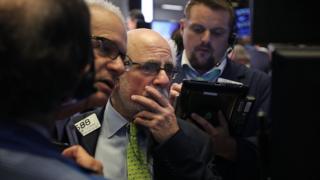 Image copyright
Getty Images
Image copyright
Getty Images
A sell-off continued among US stocks on Tuesday as investors fretted that the US-China trade war would take its toll on the technology sector.
The Dow Jones Industrial Average fell as much as 500 points, while the broader S&P 500 sank into negative territory for the year to date.
The tech-heavy Nasdaq index fell to its lowest level since April, with shares in Apple down another 3% to $180.
In London, the FTSE 100 index slipped back below the 7,000 point level.
Oil prices also tumbled on Tuesday, with Brent crude sinking $3 to $63.77 a barrel - the lowest level since March.
Connor Campbell at Spreadex described the sell-off as a "macro-car crash, with Brexit fears, the post-Apec pre-G20 US-China trade war flare-up and the continuation of a nasty US tech sell-off resulting in absolute carnage".
Analysts at Goldman Sachs cut their price target for Apple shares from $209 to $182, blaming very weak demand from China in the late summer as well as a stronger US dollar.
"Investors are concerned that sooner rather than later the tech sector is going to be fully embroiled in the US-China trade battle, exacerbating the softness caused by reports of a slowdown in iPhone demand," Mr Campbell added.
US retailers were punished for weak results and forecasts, with shares in Target sinking 10%, while Kohl's tumbled 9% and Walmart was dragged 3% lower.
Analysis: Air runs out of stock market rally
By Michelle Fleury, New York business correspondent
The balloons will soon be inflated for the Thanksgiving Day parade just as the air seems to be coming out of the US markets.
Tuesday's sell-off seemed to be sparked by disappointing earnings from several retailers.
Aside from that, Wall Street traders offered up several reasons for the recent volatility.
One was President Trump's trade war with China. Any escalation could hurt US and Chinese companies by raising production costs and the price for consumers.
Another was the prospect that America's central bank could raise interest rates to combat inflation and stop the economy from overheating. This makes it more expensive for companies to borrow and invest.
Whatever is behind the latest stock market gyrations, it's worth remembering that the current bull market is the oldest in history.
For months some have warned that the US market is overvalued. In which case what you may be witnessing is a shift as investors move from chasing yield - financial jargon for the return on their investment - to managing risk.
Michael O'Rouke at Jonestrading said retailers as well as big technology firms such as Amazon and Facebook had pushed the market higher for most of this year.
"Now that's fading, so people are more apt to take profit and de-risk going into the year-end. There are the headwinds of the trade war out there. The fiscal stimulus from tax cuts is starting to fade ... we don't have many positive catalysts," he said.
Hans Redeker at Morgan Stanley commented: "For the US equity market to stabilise, either the rest of the world will have to show better growth or the Fed will have to moderate its stance."
In Frankfurt, the DAX index fell 1.5%, while in Paris, the CAC 40 was 1.2% lower. Shares in Deutsche Bank fell 4% to hit a record low.